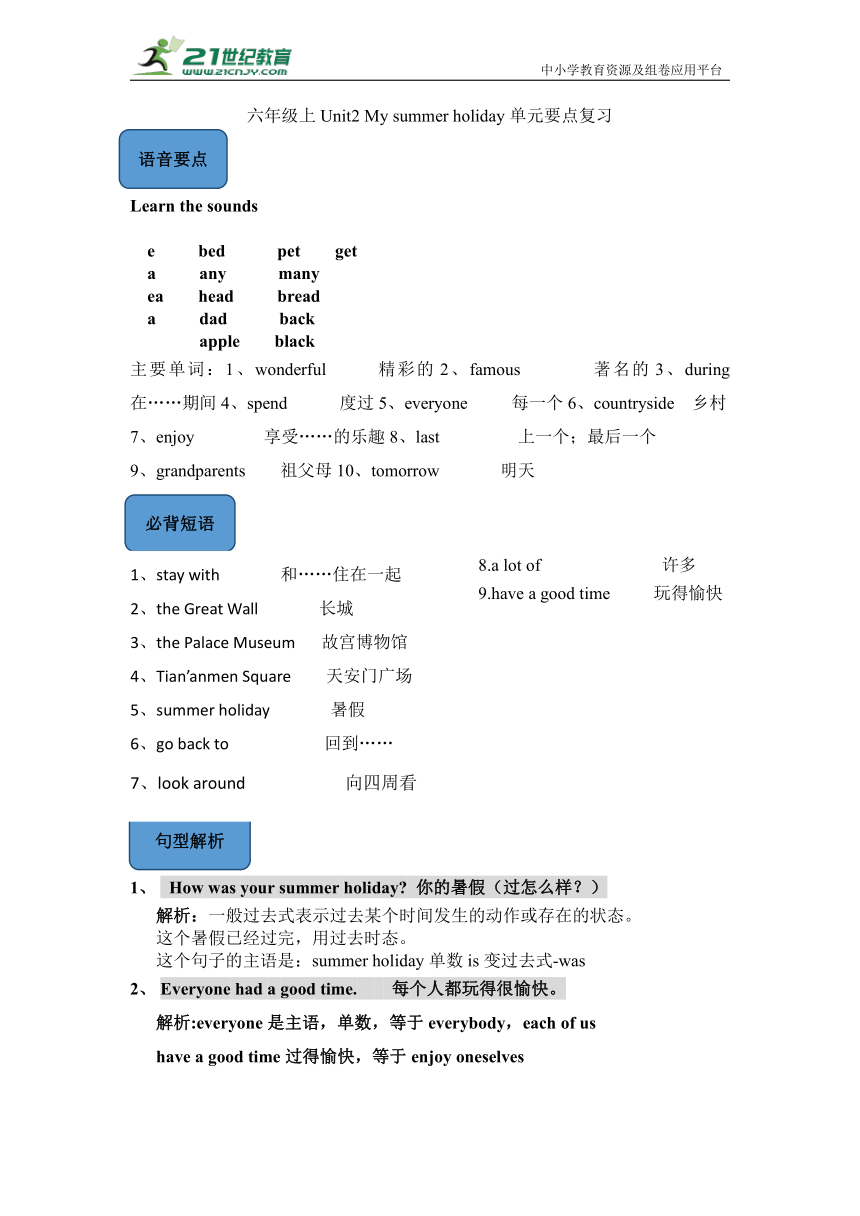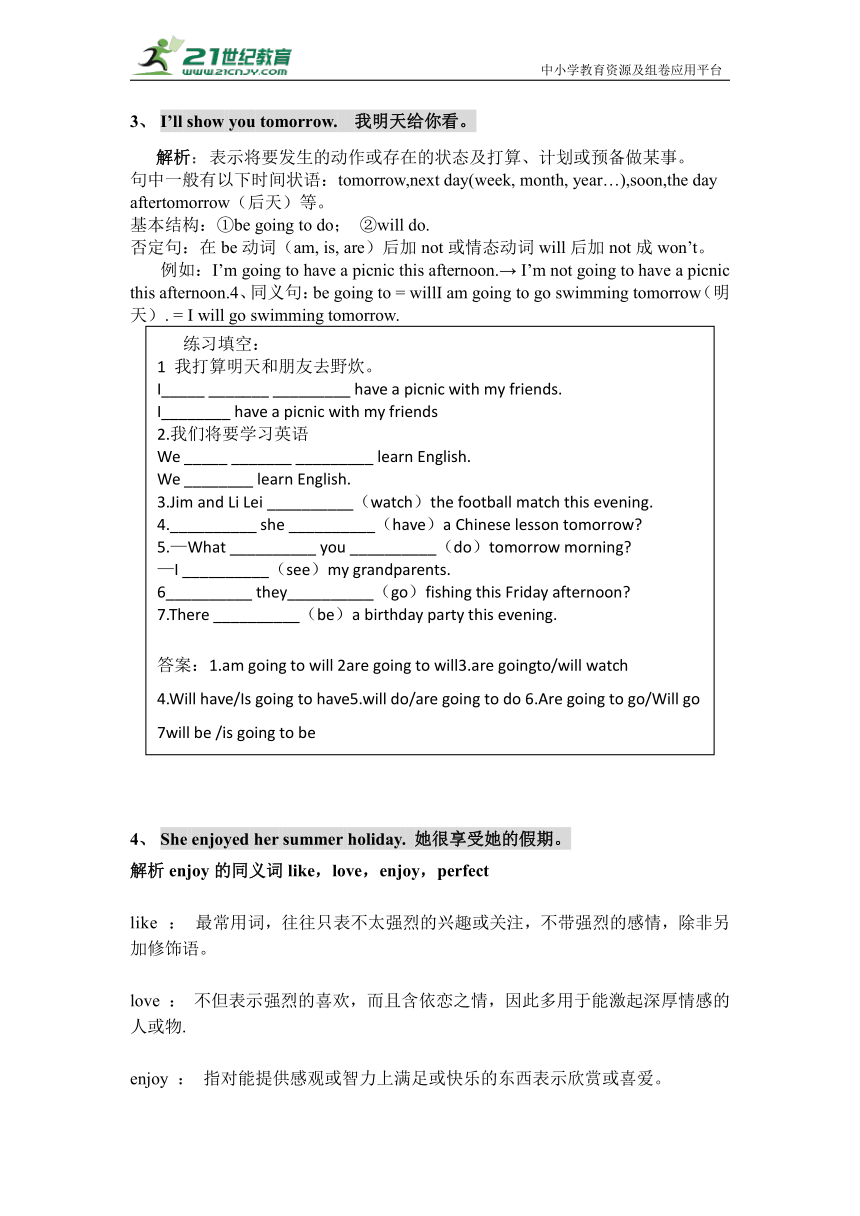Unit2 My summer holiday单元要点复习学案(含答案)
文档属性
| 名称 | Unit2 My summer holiday单元要点复习学案(含答案) |

|
|
| 格式 | docx | ||
| 文件大小 | 44.5KB | ||
| 资源类型 | 试卷 | ||
| 版本资源 | 牛津深圳版 | ||
| 科目 | 英语 | ||
| 更新时间 | 2021-11-19 15:45:44 | ||
图片预览


文档简介
中小学教育资源及组卷应用平台
六年级上Unit2 My summer holiday单元要点复习
(
语音要点
)
Learn the sounds
e bed pet get
a any many
ea head bread
a dad back
apple black
主要单词:1、wonderful 精彩的2、famous 著名的3、during 在……期间4、spend 度过5、everyone 每一个6、countryside 乡村
7、enjoy 享受……的乐趣8、last 上一个;最后一个
9、grandparents 祖父母10、tomorrow 明天
(
必背短语
)
(
8.a lot of 许多
9.have a good time 玩得愉快
)
(
1、stay with 和……住在一起
2、the Great Wall 长城
3、the Palace Museum 故宫博物馆
4、Tian
’
anmen Square 天安门广场
5、summer holiday 暑假
6、go back to 回到……
7、
look around
向四周看
14
、
catch flies
捉苍蝇
)
(
句型解析
)
得)
How was your summer holiday 你的暑假(过怎么样?)
解析:一般过去式表示过去某个时间发生的动作或存在的状态。
这个暑假已经过完,用过去时态。
这个句子的主语是:summer holiday单数is变过去式-was
Everyone had a good time. 每个人都玩得很愉快。
解析:everyone是主语,单数,等于everybody,each of us
have a good time过得愉快,等于enjoy oneselves
I’ll show you tomorrow. 我明天给你看。
解析:表示将要发生的动作或存在的状态及打算、计划或预备做某事。
句中一般有以下时间状语:tomorrow,next day(week, month, year…),soon,the day aftertomorrow(后天)等。
基本结构:①be going to do; ②will do.
否定句:在be动词(am, is, are)后加not或情态动词will后加not成won’t。
例如:I’m going to have a picnic this afternoon.→ I’m not going to have a picnic this afternoon.4、同义句:be going to = willI am going to go swimming tomorrow(明天). = I will go swimming tomorrow.
(
练习填空:
1
我打算明天和朋友去野炊。
I
_____ _______ _________ have a picnic with my friends.
I
________ have a picnic with my friends
2.我们将要学习英语
We _____ _______ _________ learn English.
We ________ learn English.
3.Jim and Li Lei __________(watch)the football match this evening.
4.__________ she __________(have)a Chinese lesson tomorrow
5.—What __________ you __________(do)tomorrow morning
—I __________(see)my grandparents.
6__________ they__________(go)fishing this Friday afternoon
7.There __________(be)a birthday party this evening.
答案:1.am going to will 2are going to will3.are goingto/will watch
4.Will have/Is going to have5.will do/are going to do 6.Are going to go/Will go
7will be /is going to be
)
She enjoyed her summer holiday. 她很享受她的假期。
解析enjoy的同义词like,love,enjoy,perfect
like : 最常用词,往往只表不太强烈的兴趣或关注,不带强烈的感情,除非另加修饰语。
love : 不但表示强烈的喜欢,而且含依恋之情,因此多用于能激起深厚情感的人或物.
enjoy : 指对能提供感观或智力上满足或快乐的东西表示欣赏或喜爱。
prefer : 指有选择性或偏向性的喜欢
They spend their holiday in London. 他们在伦敦度过他们的假期。
解析:1. 在使用spend时,主语只能是表示人的名词或代词。例如:
Andy spent a lot of money on books. Andy花了很多钱买书。
2. 若表示"在......上花费(时间、金钱等)",常用句型spend some money/ some time on sth.,介词on后接名词或代词。
例如:Kitty spends two hours on her homework every day. Kitty每天花两个小时做家庭作业。
3. 若表示"花费(时间、金钱等)做某事",则常用句型spend some money / some time (in) doing sth.,此时第二个动词要用动词-ing形式,介词in可以省略。
例如:They spent 4450 yuan buying the big colour TV set. 他们买那台大彩电花了4450元。另外,spend也有"度过"的意思。例如:
They want to spend their summer holiday in the country.他们想去乡下过暑假
6. She went there by plane.
解析:by plane=by air通常放在句子末尾
by ship=by sea
同义句:She took a plane there.
介词in ,on和by都可以与表示交通工具的名词搭配,表示交通方式,但其用法各不相同:
1.用“by+交通工具名词”表示交通方式.此时交通工具的名词只能用单数,不能用复数,也不能被冠词或物主代词等限定.如:by bike(骑自行车),by bus(乘公共汽车),by car(乘出租车),by train(乘火车),by ship(乘轮船),by plane(乘飞机)等.如:
They often go home by bus.他们经常坐公共汽车回家.
I come here by taxi.我乘出租车来这儿的.
He goes to work by bike.他骑自行车去上班.
2.用“by+交通路线的位置”来表示交通方式.如:by land(从陆路),by water(从水路),by sea(从海路),by air(乘飞机)等.如:
They go to England by air.他们乘飞机去英国.
3.用“in(on)+交通工具名词”.此时交通工具名词前必须有冠词、名词所有格形式或形容词性物主代词等限定词修饰.其用法与“by+交通工具名词”相似.如:
He often goes to school on a(his)bike.他经常骑自行车去上学.
Don't come here on /in the ship.不要坐船来这里.
We go there in a car.我们乘小汽车去那里.
4.用“take a(the)+交通工具名词”表示交通方式.如:take a bus(乘公共汽车),take a train(乘火车),take a ship(乘轮船),take a plane(乘飞机);但“骑自行车”要用 ride a bike来表示.如:
Will you take a bus to go there 你乘汽车去那
5.表示“步行去某地”,可用下列两种句式:
(1)go to +某地+ on foot.如:
She g oes to w ork on foot.她步行去上班.
注意:on foot不可说成 on feet,on a /the /my foot,by foot等.
(2)walk to +某地.如:
He walks to school every day .=He goes to school on foot every day .
他每天步行去上学.
(
练习题:
1.-----Do you usu
a
lly go to school______bus
-----No,I usually go there _____foot.
A by,with B by,on C on,by D on,on
2.I often go to work___subway.
A with B on C in D by
答案:BD
)
六年级上Unit2 My summer holiday单元要点复习
(
语音要点
)
Learn the sounds
e bed pet get
a any many
ea head bread
a dad back
apple black
主要单词:1、wonderful 精彩的2、famous 著名的3、during 在……期间4、spend 度过5、everyone 每一个6、countryside 乡村
7、enjoy 享受……的乐趣8、last 上一个;最后一个
9、grandparents 祖父母10、tomorrow 明天
(
必背短语
)
(
8.a lot of 许多
9.have a good time 玩得愉快
)
(
1、stay with 和……住在一起
2、the Great Wall 长城
3、the Palace Museum 故宫博物馆
4、Tian
’
anmen Square 天安门广场
5、summer holiday 暑假
6、go back to 回到……
7、
look around
向四周看
14
、
catch flies
捉苍蝇
)
(
句型解析
)
得)
How was your summer holiday 你的暑假(过怎么样?)
解析:一般过去式表示过去某个时间发生的动作或存在的状态。
这个暑假已经过完,用过去时态。
这个句子的主语是:summer holiday单数is变过去式-was
Everyone had a good time. 每个人都玩得很愉快。
解析:everyone是主语,单数,等于everybody,each of us
have a good time过得愉快,等于enjoy oneselves
I’ll show you tomorrow. 我明天给你看。
解析:表示将要发生的动作或存在的状态及打算、计划或预备做某事。
句中一般有以下时间状语:tomorrow,next day(week, month, year…),soon,the day aftertomorrow(后天)等。
基本结构:①be going to do; ②will do.
否定句:在be动词(am, is, are)后加not或情态动词will后加not成won’t。
例如:I’m going to have a picnic this afternoon.→ I’m not going to have a picnic this afternoon.4、同义句:be going to = willI am going to go swimming tomorrow(明天). = I will go swimming tomorrow.
(
练习填空:
1
我打算明天和朋友去野炊。
I
_____ _______ _________ have a picnic with my friends.
I
________ have a picnic with my friends
2.我们将要学习英语
We _____ _______ _________ learn English.
We ________ learn English.
3.Jim and Li Lei __________(watch)the football match this evening.
4.__________ she __________(have)a Chinese lesson tomorrow
5.—What __________ you __________(do)tomorrow morning
—I __________(see)my grandparents.
6__________ they__________(go)fishing this Friday afternoon
7.There __________(be)a birthday party this evening.
答案:1.am going to will 2are going to will3.are goingto/will watch
4.Will have/Is going to have5.will do/are going to do 6.Are going to go/Will go
7will be /is going to be
)
She enjoyed her summer holiday. 她很享受她的假期。
解析enjoy的同义词like,love,enjoy,perfect
like : 最常用词,往往只表不太强烈的兴趣或关注,不带强烈的感情,除非另加修饰语。
love : 不但表示强烈的喜欢,而且含依恋之情,因此多用于能激起深厚情感的人或物.
enjoy : 指对能提供感观或智力上满足或快乐的东西表示欣赏或喜爱。
prefer : 指有选择性或偏向性的喜欢
They spend their holiday in London. 他们在伦敦度过他们的假期。
解析:1. 在使用spend时,主语只能是表示人的名词或代词。例如:
Andy spent a lot of money on books. Andy花了很多钱买书。
2. 若表示"在......上花费(时间、金钱等)",常用句型spend some money/ some time on sth.,介词on后接名词或代词。
例如:Kitty spends two hours on her homework every day. Kitty每天花两个小时做家庭作业。
3. 若表示"花费(时间、金钱等)做某事",则常用句型spend some money / some time (in) doing sth.,此时第二个动词要用动词-ing形式,介词in可以省略。
例如:They spent 4450 yuan buying the big colour TV set. 他们买那台大彩电花了4450元。另外,spend也有"度过"的意思。例如:
They want to spend their summer holiday in the country.他们想去乡下过暑假
6. She went there by plane.
解析:by plane=by air通常放在句子末尾
by ship=by sea
同义句:She took a plane there.
介词in ,on和by都可以与表示交通工具的名词搭配,表示交通方式,但其用法各不相同:
1.用“by+交通工具名词”表示交通方式.此时交通工具的名词只能用单数,不能用复数,也不能被冠词或物主代词等限定.如:by bike(骑自行车),by bus(乘公共汽车),by car(乘出租车),by train(乘火车),by ship(乘轮船),by plane(乘飞机)等.如:
They often go home by bus.他们经常坐公共汽车回家.
I come here by taxi.我乘出租车来这儿的.
He goes to work by bike.他骑自行车去上班.
2.用“by+交通路线的位置”来表示交通方式.如:by land(从陆路),by water(从水路),by sea(从海路),by air(乘飞机)等.如:
They go to England by air.他们乘飞机去英国.
3.用“in(on)+交通工具名词”.此时交通工具名词前必须有冠词、名词所有格形式或形容词性物主代词等限定词修饰.其用法与“by+交通工具名词”相似.如:
He often goes to school on a(his)bike.他经常骑自行车去上学.
Don't come here on /in the ship.不要坐船来这里.
We go there in a car.我们乘小汽车去那里.
4.用“take a(the)+交通工具名词”表示交通方式.如:take a bus(乘公共汽车),take a train(乘火车),take a ship(乘轮船),take a plane(乘飞机);但“骑自行车”要用 ride a bike来表示.如:
Will you take a bus to go there 你乘汽车去那
5.表示“步行去某地”,可用下列两种句式:
(1)go to +某地+ on foot.如:
She g oes to w ork on foot.她步行去上班.
注意:on foot不可说成 on feet,on a /the /my foot,by foot等.
(2)walk to +某地.如:
He walks to school every day .=He goes to school on foot every day .
他每天步行去上学.
(
练习题:
1.-----Do you usu
a
lly go to school______bus
-----No,I usually go there _____foot.
A by,with B by,on C on,by D on,on
2.I often go to work___subway.
A with B on C in D by
答案:BD
)
同课章节目录
- Module 1 Getting to know each other
- Unit 1 Growing up
- Unit 2 My summer holiday
- Unit 3 Healthy or unhealthy?
- Revision 1
- Project 1
- Module 2 Relationships
- Unit 4 Our neighbours
- Unit 5 Animals in dange
- Unit 6 E-friends
- Revision 2
- Project 2
- Module 3 Out and about
- Unit 7 Seeing a film
- Unit 8 Visiting museums
- Unit 9 Great cities of the world
- Revision 3
- Project 3
- Module 4 The natural world
- Unit 10 Ai
- Unit 11 Trees
- Unit 12 The Earth
- Revision 4
- Project 4
